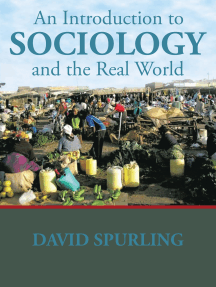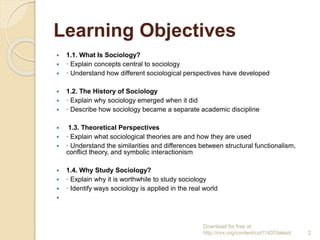Sociology is the study of human social relationships and institutions. It seeks to understand how societies function and how people interact with one another. Sociologists study a wide range of topics, including the family, education, crime, and even the impact of technology on society.
One way to introduce sociology to a layperson is to examine how it applies to everyday life. For example, consider the concept of socialization. This refers to the process by which people learn the values, beliefs, and behaviors that are acceptable in their culture. Socialization begins at birth and continues throughout a person's life.
One of the primary agents of socialization is the family. Children learn how to behave and interact with others from their parents and other family members. They also learn about their culture and society through the media, religious institutions, and their peers.
Another important concept in sociology is culture. Culture refers to the shared beliefs, values, customs, behaviors, and artifacts that characterize a group or society. Culture influences how we perceive and interpret the world around us. It shapes our beliefs about what is right and wrong, and it influences how we behave and interact with others.
Sociologists also study the impact of institutions on society. Institutions are the organized structures that shape society and its norms. Examples of institutions include the government, the economy, the education system, and the media. These institutions have a powerful influence on the way people think and behave.
One real-world example of the impact of institutions is the education system. The education system is responsible for teaching children the skills and knowledge they need to succeed in society. It also plays a role in socializing children and shaping their values and beliefs. However, the education system is not a neutral entity. It can reproduce social inequalities and reinforce existing power dynamics. For example, students from disadvantaged backgrounds may have fewer resources and opportunities than their more privileged peers, leading to unequal outcomes.
In conclusion, sociology is a fascinating field that helps us understand the complex social relationships and institutions that shape our lives. By examining concepts such as socialization, culture, and institutions, we can gain a deeper understanding of the world around us and how it impacts our daily lives.
The Real World: An Introduction to Sociology

Apparently, you can get a PhD and publish a textbook without doing that basic math. With a clever mix of popular culture, everyday life, and extensive student activities, The Real World fully realizes sociology's unique ability to stimulate students intellectually as well as resonate with them personally. So, the authors expect that 13% of all doctors, surgeons, and dentists in the country and everything requiring a Master's degree or higher are supposed to be made up by just 1. Theoretical Approaches to Understanding Race Structural Functionalism Conflict Theory Symbolic Interactionism IN RELATIONSHIPS: From the Lovings to Kimye: Interracial Dating and Marriage Race, Ethnicity, and Life Chances Family Health Education Work and Income ON THE JOB: Diversity Programs: Do They Work? The Contingent Workforce The Third Sector and Volunteerism Time for a Vacation? Although the book was edifying in explaining, for example, the research methods of sociology and particular phenomena sociologists study, the presentation of sociology in this book, as the definition indicates, is that the discipline is a kind of systematized common sense, resulting in the kinds of findings anyone would reach if she studied the social world as impartially as possible. The authors make several mistakes and fail to back up many of their claims. وقد كان الكتاب نعم المدخل بفضل الله.
The Real World: An Introduction to Sociology Chapter 14 Health and Illness Flashcards

أختار علمًا أودّ القراءة فيه بعمق واهتمام. أبحث عن كتبه الأكاديمية المرجعية، ثمّ أختار أحدها، مع الحرص على أن يكون وافيًا ومعتمدًا قدر الإمكان، ثمّ أقرأه متمهلاً ، كل يومٍ 5 إلى 10 صفحات. Trends in Leisure ON THE JOB: Professional Musicians: Playing Is Work The Study of Media The Media and Democracy The Structure of Media Industries DATA WORKSHOP: Analyzing Media and Pop Culture: Blockbuster Hits and the Business of Movies The Regulation of Media Content Culture and Consumption of Media High, Low, and Popular Culture IN THE FUTURE: The Return of Free-Range Kids? In effect, it's a study comparing how often men and women have sex given a man's tendency today do traditionally male or female house chores and suggests that the more traditional the household roles are the more often the couple has sex. Apparently, you can get a PhD and publish a textbook without doing that basic math. IN RELATIONSHIPS: Can a Relationship with God Improve Your GPA? Discrimination in the job market. Media Effects and Audiences Theories of Media Effects Active Audiences: Minimal Effects Theories Interpretive Strategies and Communities Leisure and Relationships GLOBAL PERSPECTIVE: The Other Football Leisure and Community Collectors and Hobbyists Hangouts: The Third Place IN RELATIONSHIPS: Fan—Celebrity Relations DATA WORKSHOP: Analyzing Everyday Life: Now Go Hang Out Travel and Tourism Closing Comments CHAPTER 14: Health and Illness How to Read This Chapter The Sociology of Medicine, Health, and Illness Defining Health and Illness Types of Illnesses Approaches to Medical Treatment DATA WORKSHOP: Analyzing Everyday Life: Student Health Issues Survey The Process of Medicalization The Social Construction of Mental Illness IN THE FUTURE: Solving the Mystery of Autism Epidemiology and Disease Patterns Social Inequality, Health, and Illness Intersections of Class GLOBAL PERSPECTIVE: Zika Virus: Women and Children Last Intersections of Race Intersections of Gender IN RELATIONSHIPS: Better Living through Chemistry Inequality and the Problem of Food Deserts Medicine as a Social Institution Institutional Contexts Doctor—Patient Relations ON THE JOB: Cultural Competence in Health Professions The Sick Role DATA WORKSHOP: Analyzing Media and Pop Culture: Medicine on Television Issues in Medicine and Health Care Health Care Reform in the United States Complementary and Alternative Medicine Medical Ethics End of Life Closing Comments PART V: Envisioning the Future and Creating Social Change CHAPTER 15: Populations, Cities, and the Environment How to Read This Chapter Population Demography IN THE FUTURE: Living to 150 Theories of Population Change Cities Trends in Urbanization ON THE JOB: Agriculture: From the Country to the City DATA WORKSHOP: Analyzing Media and Pop Culture: Imagining the Cities of Tomorrow Living in the City IN RELATIONSHIPS: Encounters with Strangers The Environment Environmental Problems GLOBAL PERSPECTIVE: Water, Water Everywhere but Not a Drop to Drink Environmental Sociology DATA WORKSHOP: Analyzing Everyday Life: Student Attitudes on Environmentalism Closing Comments CHAPTER 16: Social Change How to Read This Chapter What Is Social Change? The Media and the Political Process DATA WORKSHOP: Analyzing Media and Pop Culture: Satirical News Shows Patriotism and Protest Politics: The Micro-Macro Link What Is Education? With a clever mix of popular culture, everyday life, and extensive student activities, The Real World fully realizes sociology's unique ability to stimulate students intellectually as well as resonate with them personally.








